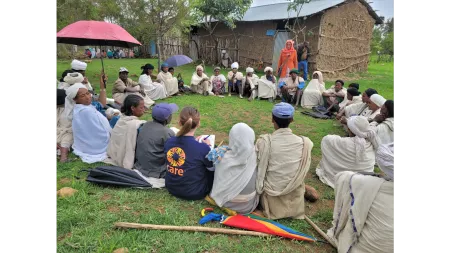Sarah Easter is Emergency Communications Officer at CARE Germany and CARE Austria. In October, she went to Ethiopia to meet some of the amazing people with whom CARE works in the country. She shared some highlights of what she has seen and heard during the encounters with fantastic women, men and girls who have impacted their community and are changing norms and traditions every day.
The further we drive, the less people are on the road, but we still meet many groups with their livestock and on their way to the market to sell them. Holding a chicken under the arm and pulling a goat on a rope. We pass tall huts made from long wooden sticks. Women are sitting in front of their huts, cooking on small fireplaces. Young girls carrying yellow jerry cans with water. On the fields young boys stand on a small mound overseeing their cattle herds.
After nearly two hours on the dirt path, the road suddenly ends. We need to continue on foot to a small village in which CARE works with the community. I stop to pet a cow, which kicks me back in thanks. My boots get stuck in the thick mud more than once. After about half an hour of walking we reach the small village. I am sitting in one of these tall wooden huts on a small stool with my very strong cup of coffee.
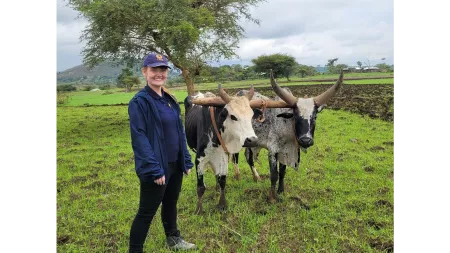
Women walk for hours
The woman living here tells me that every other day she and her neighbors walk the path to the next town we just came through by car to sell their crops, livestock, dairy products or eggs and to buy food. Every day they also walk up to two hours with their jerry cans strapped to their back to fetch water. I only walked for half an hour and was already feeling exhausted because the terrain is not easy to navigate. These women and young girls walk these paths every day for hours and hours with heavy water cans on their back.
Every village and every home I enter is so open and welcoming. Over my time in Ethiopia, I have been invited to a hundred cups of coffee and many lunches. The community members talk openly to me about how attitudes towards early marriage changed, that they stopped with the practice of female genital mutilation and that they now talk openly about contraceptive measures with each other. One man tells me proudly that he now cooks breakfast every day for his wife where before he would have seen it as a great insult to him. Another man holds his baby girl protectively and explains to me that she has not been cut. A father smiles while telling me that his daughter negotiated with him to cancel her marriage and that he agreed to her.
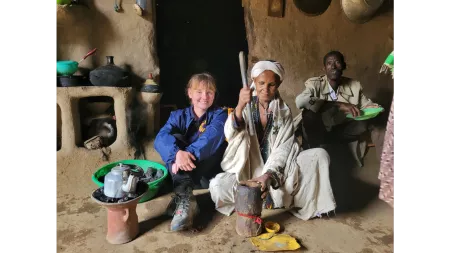
Walking home as a group
When I approach a group of community members sitting in a big circle, they immediately switch seats to open up a small stone for me to sit and join them. This makes me feel like an equal part of the group. When I finish asking my questions, the community members start asking their own questions back at me. Do we have harmful practices like early marriage in Austria and Germany? How do you solve problems? At what age do you marry in your country? Am I married?
Terhune, one of the group members, joins me for a few more questions and I thank the group for taking their time, as I knew that their families are waiting for them. While talking to her I see that the group is still sitting in their circle. Asking why, she tells me, that they are waiting for her: they always walk home together as a group. I ask her how far their home is. It takes them one hour. I finish the interview quickly so the group can get home to their families. They just laugh and invite me to come and join them for lunch and coffee.
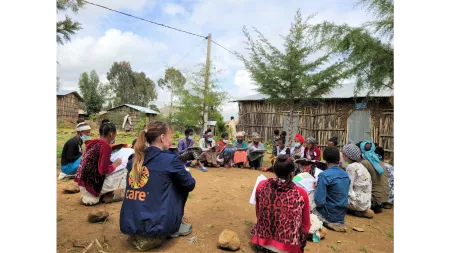
Overcoming taboos
The communities I visited are full of movement: walking far distances, working on their fields, cooking in front of their huts, taking care of their livestock. They take care of each other and include each other in their lives and decisions. They wait for each other, eat, and cook together and treat each other as equals. They are proud of their successes, such as reducing the practice of female genital mutilation to 0. It is amazing to see how open they talk about topics that are considered a taboo not long ago, making sure that every girl is healthy and old enough for marriage.
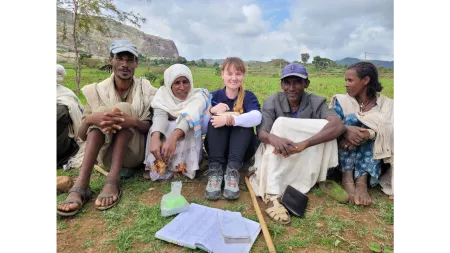
Each year, CARE International collects and reports program data from our offices around the world. Monitoring data from our programs around the globe is fundamental to ensure the work we conduct with our partners is having effective results to reduce poverty and increase social justice.
More on our impact